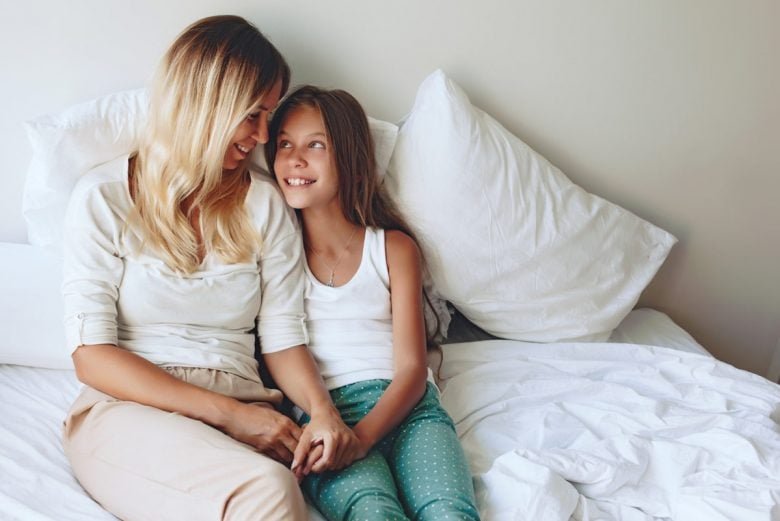
You can affirm your child at any age—even as an adult.
If you’ve ever wished you found The Child Whisperer sooner, you’re not the only one. But it’s never too late to be a better parent.
In this episode, Carol and Anne share ways to counteract any ways you shamed your child in the past, and how to validate them now that understand them better after reading The Child Whisperer.
This week’s Parenting Practice
Get out The Child Whisperer book. Look up your child’s Type, and pick two or three phrases of validation that you want to share with them. Look for the opportunity to present itself to use those phrases and validate your child’s true nature—whether they’re 2 or 52 years old.
(Phrases found here. Type 1: pp. 86-94 / Type 2: pp. 148-155 / Type 3: pp. 213-221 / Type 4: pp. 288-296)
Transcript of podcast episode
Anne: Your Little Carol inside is going, “Yay…
Carol: Yeah, thanks…
Anne: …thanks mom.”
Carol: …for seeing me for who I am. And so…
Anne: I mean, that’s still with you, 14 years later, that has meant a lot to you.
Carol: Welcome to The Child Whisperer Podcast. I’m your host, Carol Tuttle, author of the best-selling parenting book, The Child Whisperer. I’m with my co-host, Anne Tuttle Brown.
Anne: “I’m a Type 2 mom and I have a 10-year-old Type 3 daughter. I’m afraid I might have suppressed her as a child because I didn’t know about The Child Whisperer. How can I make up for lost time and make sure that what I was doing before I had The Child Whisperer doesn’t affect her negatively?”
Carol: We get that question quite a bit. In fact, even from parents of adult children that will comment, “I wish I had known this when my children were young,” and my go-to phrase is always, “It’s never too late to be a great parent,” because always, always as a parent, you are either validating, supporting, or dishonoring unknowingly your child’s true self.
Anne: You didn’t have this information until I was 18, out of the house and I mean, we’ve made great strides in our relationship because of this information in the, you know, later years of my life as a child.
Carol: And part of our human psychology is any unmet need or lack of validation that we were not able to receive in our childhood, our psyche is still seeking it. And so you’re able to make up the difference actually quite easily, no matter the age of your child, if you weren’t able to give them the validation and support they needed when they were young because it’s just part of our human development that’s sort of hanging out there still going, “Tell me I’m okay being who I am.” In fact, it’s sort of the biggest influences on what people are doing in relationships and too often people are in people pleasing tendencies because they’re still seeking to get validation from others, because they didn’t get a sufficient amount as a child.
So any parent can give validation and support when they know this information, so age becomes irrelevant. What can you do though? Because by age 10 if you have not honored your child’s true nature, and in this case if you’re a Type 2 parent with a high-movement, push-forward, determined Type 3 child, good chance there’s been a lot of shushing and…
Anne: Stifling.
Carol: …sit still and stifling and trying to counter this movement with calming it down. And so you’ve sent a message by age 10: It’s not safe or appropriate to be who you are, it’s not okay. So children then will pick up tendencies and habits to counter their true nature by age 10 and now you can help them let those go. You can start to unwind anything that they’ve been patterned to do to please you. And that’s the difference. What behavior are they conditioned to do in an effort to please the parent versus what is just natural behavior that needs to be validated, acknowledged, and honored verbally, and supported?
Anne: How empowering for a child to be able to get that direction from a parent of like correction, of like let me help you go this direction. I would even say in The Child Whisperer, we have a lot of keywords for every Type of child. Use those in your vocabulary as you praise and affirm your child.
Carol: I have statements of validation for each Type of child in different phases of life that you can actually bring into your everyday language and weave it in even if your child’s 35, even if your child’s 2. These are messages. It’s good to be you. My mother is a Type 2 and she learned of my nature when I was developing this information around 2004. And she started to understand me better, and she actually made apologies to me and even acknowledged me as an adult woman in her 40s saying…
Anne: Well, those are null and void because you’re 60 and the last time I…
Carol: No, it was great to finally hear it.
Anne: Yeah, exactly.
Carol: I was like that’s very…
Anne: What did she say to you?
Carol: …fabulous. Thank you, Mom. You’re a go-getter. I see that now. You and I are a lot different. Your tendency is to really, you know, just to have more confidence than me and put yourself out there and take risks. And that just really was validating and at the time you figure…you know, I was born in 1957, it’s 2004. I’m like, “Well, it’s too late, Mom. You should have told me that when I was a eight.” You know, I was like, “Thank you.”
Anne: You’re a Little Carol inside just going, “Yay…”
Carol: Yeah, thanks for seeing me for who I am.”
Anne: …thanks, Mom.
Carol: And so…
Anne: I mean, that’s still with you. Fourteen years later, that has meant a lot to you.
Carol: Yeah, and I was able to see her differently and be able to give space for her to be herself without judgment and to understand. One of the most poignant things I said to her one day and she’d said to the… She had made this comment to me since I was a teen and I think it was the difference between me being a Type 3 with a secondary 4 and her being a Type 2 with the secondary 1. She’s a very yin energy, I’m a very yang energy and based on her world view, well the, yang energy were the leaders, see and she’d say to me, “You should have been the parent.” Well, when you’re 12 hearing that, you know, it’s a little weird in your whole psyche to go, “Wait, you’re my parent. I need a parent and don’t tell me I should have been the parent.”
But it might have been a awkward compliment in a way, but I never took it as that. I took it as, “Oh, my mother is weak and she can’t show up for me the way I need to, so she’s telling me I need to show up for her in a way. “Well, we were driving along in the car one day, I’m an adult woman in my 40s and she said this again to me and I turned around and I said, “Mom, I just needed you to be my parent and you were the parent you needed to be. I should not have been the parent. You were meant to be my parent. So I don’t want you to say that to me anymore.”
Anne: What a beautiful way to say that, to acknowledge her. And also just make it clear that…
Carol: No, you know, it’s not…
Anne: I don’t like that…
Carol: …supportive to me or you. It’s putting yourself down for one thing and it’s confusing me. And I’ve heard it for, you know, three decades now, so let’s just end that and let’s just understand who we are and…
Anne: How did she respond to that?
Carol: She was cool with it. She was like, “You’re right.” On the other very memorable moment, we were actually in Hawaii, I remember the exact moment. We were in a thrift store in Wahiawa. I mean, you know Wahiawa, it’s not like we’re in upper echelon or I mean, it’s a pretty…
Anne: It’s a small town.
Carol: Yeah. We’re in a small town in Hawaii at a thrift store, and she decided I was talking too loud. No one’s even in there and she shushed me. And I went, “Mom, you don’t need to shush me anymore.” I’m like 50 at the time. I said, “Mom, you don’t need to shush me.”
Anne: That’s a good way to say it loud, “Mom, you always do that all …” You know, you just said it very clearly.
Carol: Yeah, I said, “Mom, you don’t need to shush me anymore.” It’s okay what I was doing.
Ann: How did she respond to that?
Carol: She just got it. You know, she’s being a 2, Type 2. She’s a little sheep, you know. It was a reflex, “Carol’s loud, shush her.” And I’m thinking, “I’m 50. I don’t need my mother shushing me.” So, let’s get to this question. There’s many, many opportunities for you to make up the difference. So the whole point of my stories was age is irrelevant. It doesn’t matter how old your child is. So the parenting practice this week is go to the book, go grab your Child Whisperer book and look up your child’s Type and pick two or three phrases of validation that you’re going to ask to have a chance. Just put it out there.
I’m grateful the opportunity is presenting itself that I’m able to validate my child’s true nature. If they’re 2, if they’re 50, whatever age they are, the opportunity will present itself and you’ll be able to give acknowledgement for the truth of who they are.
Anne: And as a result, you’re going to have more positive, successful relationship with your children.
Carol: Yeah, they’ll respect you, they’ll look to you, a tighter bond. They’ll see you for who you are. More harmony is created from this and that’s what we want as parents. No matter the age of your child, you want to have harmonious, loving relationships because we’re family.
Thanks for listening. For more support, go to thechildwhisperer.com where you can purchase the book, subscribe to our weekly parenting practice email and find a transcription and audio of the “Child Whisperer” podcast.
Anne: If you’re listening on iTunes, thank you for leaving a review. If you have a parenting question, please send it to [email protected].



